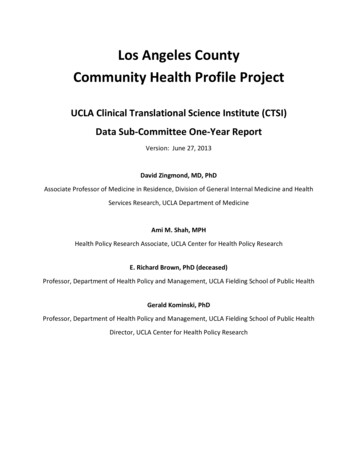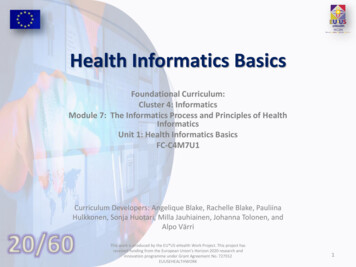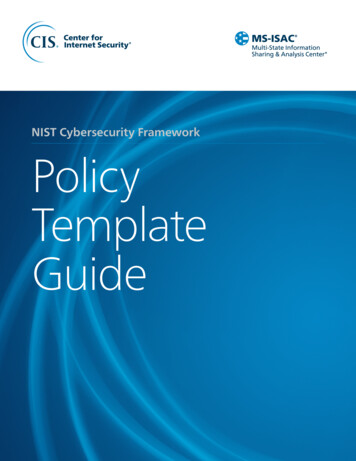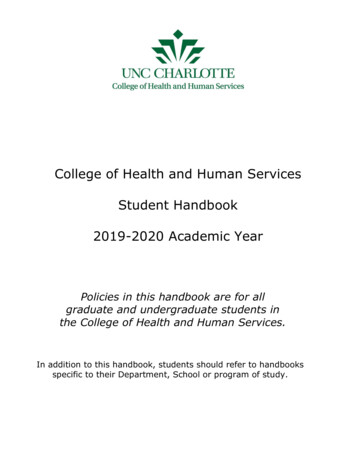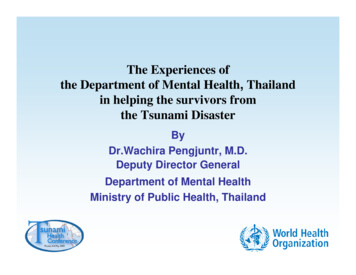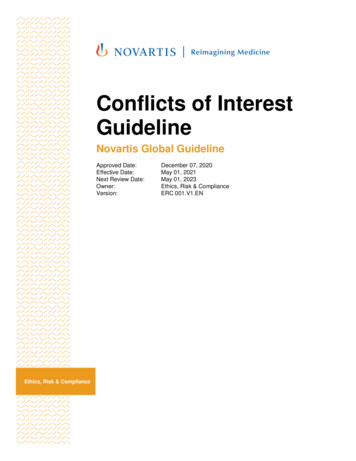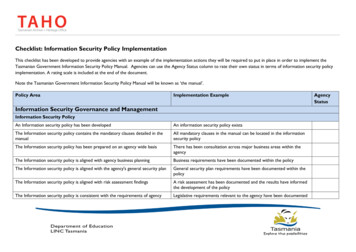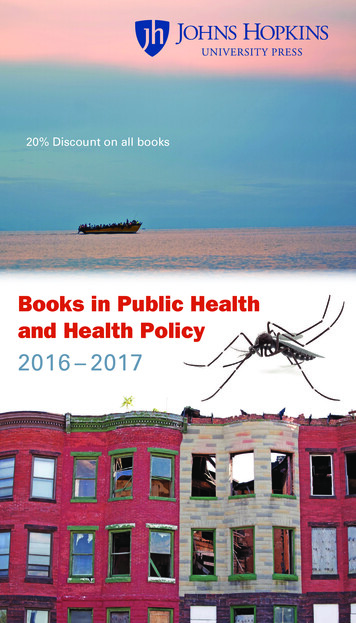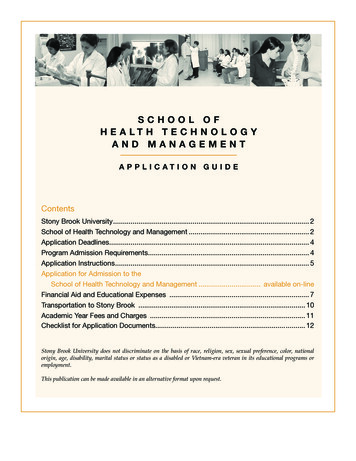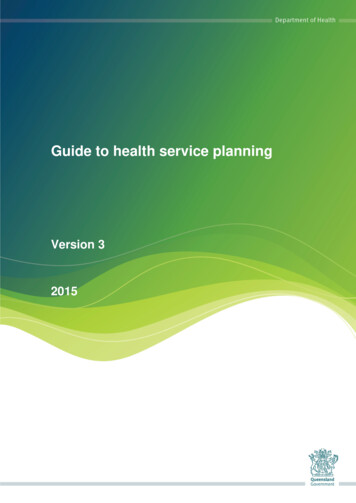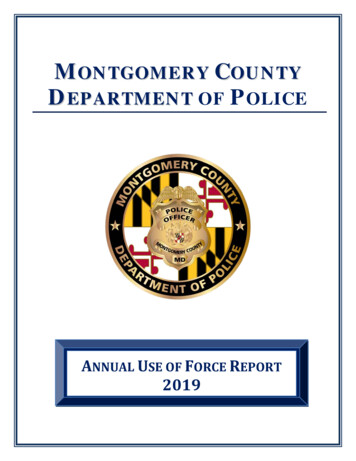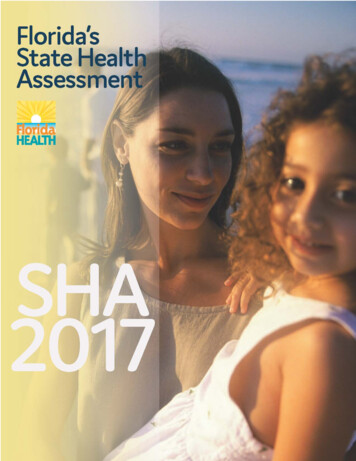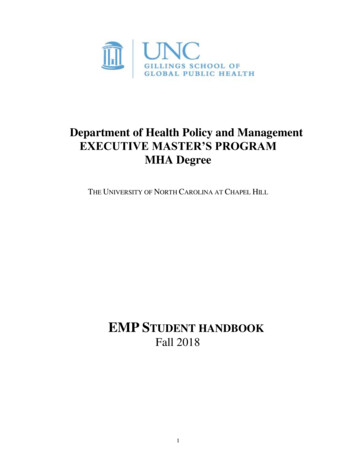
Transcription
Department of Health Policy and ManagementEXECUTIVE MASTER’S PROGRAMMHA DegreeTHE UNIVERSITY OF NORTH CAROLINA AT CHAPEL HILLCB# 7411, 120 Rosenau HallChapel Hill NC 27599-7411Phone: 919-966-7364 Fax: a/EMP STUDENT HANDBOOKFall 20181
TABLE OF CONTENTSCONTACT INFORMATIONFaculty4Faculty Areas of Expertise Link5Staff & Administrative Offices5Important Sites6Adverse Weather & Emergency Hotline: (919) 843-12346ABOUT THE EXECUTIVE MASTER'S PROGRAM7History7MHA Degree7GENERAL INFORMATION8Accreditation8Administrative Authority8Admission8Registration8Web Registration Procedures9Proof of Enrollment9Bio/Demo Information9PLAN OF STUDY9MHA Curriculum Competency Model and Definitions12KEY UNIVERSITY POLICIES14Distance Learning Course Attendance142
Nondiscrimination Policy16Honor Code16Policy on Harassment and Discrimination17ACADEMIC GUIDELINES18Transfer of Credit18Exemptions & Substitutions19Grades & Academic Eligibility20Reinstatement21Time Limit & Leave of Absence21Readmission21Graduation22MHA Program Worksheet23HPM GUIDELINES24Student Concerns and Complaints24FINANCIAL INFORMATION25Tuition Payment Options25Residence Status for Tuition Purposes25Veterans Education Benefits25GRADUATE FORMS LINK26Core Course Exemption Link, School of Public Health26OTHER POLICIES27Reading/Independent Study Courses (Guidelines For Setting Up)273
ch, EthanEmailebasch@email.unc.eduRoomPOB/Carr MillBennett, AntoniaBirken, SarahDamon, AlyssaDevlin, LeahDilworth-Anderson, PeggyeDomino, Marisa E.Dusetzina, Stacie BFrerichs, -G1103-E1103-D104 Rosenau1102-D1104-G2203 Kerr Hall1102-C966-7355966-4228966-8930/ 220537-3955966-7196966-6296/843-8269966-8125Fried, Bruce J.Gentry, William BGreene, Sandra B.Harris, Dean M.Hassmiller Lich, KristenHolmes, MarkBruce Fried@unc.eduwgentry@email.unc.edusandrab greene@unc.eduDean Harris@unc.eduhassmill@email.unc.eduMark holmes@unc.edu1104-E115 Rosenau1106-I1104-A1105-E1104-BLeatherman, SheilaLee, JessicaMorrissey, JosephOberlander, Jonathansleatherman@unc.eduJessica lee@unc.eduJoe morrissey@unc.eduJonathan Oberlander@med.unc.eduN/A228 Brauer HallSheps1106-AOrton, Stevesorton@email.unc.edu111 Rosenau966-7373843-2728/ 33962-2974966-7385966-7374445-9374Paul, John E.Pink, GeorgePorto, Jim VPowell, ByronReiter, KristinRicketts, Thomas C. IIIRozier, R GarySamuel, CleoShea, Chris MSilberman, Pam C.Simms, JeffreySlifkin, BeckySloate, SteveSong, PaulaStearns, SallyStover, AngelaSylvia, SeanThirumurthy, HarshaThomas, MargaretTrogdon, JustinUmble, KarlWeinberger,Wheeler, StephanieWhite, m ricketts@unc.edugary rozier@unc.edu1102-B1105-D114 Rosenau1105-C1104-HSheps Center1106-K1105-F1104-F1102-A117 Rosenau116 101-B113 Rosenau1105-B1103-C1106-Jchris shea@unc.edupam edusloate@email.unc.edupsong@email.unc.edusally stearns@unc.edustoveram@email.unc.eduSean .eduStephanie wheeler@unc.eduAlex white@unc.eduFor the Department of Health Policy and Management Faculty List by Area of Expertise, please visit:http://sph.unc.edu/files/2013/07/hpm 44966-7394966-9122966-7392Barrett, PaulBeach, NancyCapps, KarenForman, StephanieGault, en capps@unc.edu1106-C1106-F212 Rosenau1101-A1107-Aterrigault@unc.edu4
966-3121966-7391Hooker, ValerieJones, 966-7368966-7393966-7390962-4943966-7364Jones, StacieLathia, TinaPadgett, CathyScott, JenniferSieler, KimStacie jones@unc.eduTina lathia@unc.eduCathy padgett@unc.eduJennifer scott@unc.edukrsieler@email.unc.edu966-4609Siler, 1107-C118 E OFFICESCHAIR’S OFFICEMorris Weinberger, ChairStephanie Forman, Assistant to the Chair966-7385966-9122Terri Gault, Business & Administrative ManagerStacie Jones, Human Resources Manager & Account Technician966-7392966-7368Marisa Domino, Director966-3891Pam Silberman, Director966-4525Paula Song, Director966-8778Bill Gentry, EMP Director, and Director, Community Preparedness & Disaster ManagementKim Sieler, Assistant Registrar-Executive Programs966-4228966-7364Karl Umble, Director962-2974Lynnette Jones, RegistrarJackie Siler, Assistant Registrar966-7391966-4609Jeffrey Simms, DirectorCathy Padgett, Career Services Coordinator966-7380966-7390Paul Barrett – IT ManagerNancy Beach – Distance Learning Support Specialist966-5074843-7244BUSINESS OFFICEPhD DOCTORALPROGRAMDrPH DOCTORALPROGRAMMASTER’S T SERVICESPROFESSIONALDEVELOPMENTSYSTEMS SPECIALISTS5
IMPORTANT SITESSERVICESChapel Hill TransitAccessibility Resources& ServiceONYENHeelMailLOCATIONGraduate School - forms200 Bynum Hall450 Ridge Road022 UndergraduateLibraryGraduate School - HandbookHealth Sciences LibraryColumbia StreetInternational Student &Fed Ex Global EducationScholar ServicesCenter301 Pittsboro StreetUNC Funding200 Bynum HallOpportunitiesHPM Web Site135 Dauer DrivePHONEWEB SITEwww.ci.chapel-hill.nc.us/transit(919) 962-8300http://accessibility.unc.edu/(919 )962-4357https://onyen.unc.edu/(919) ly-askedquestions/(919) .pdf(919) 966-0800http://www.hsl.unc.edu(919) 962-5661http://oisss.unc.edu(919) 966-2611(919) 966-7350NC Resident StatusSASB North962-6324RegistrationSASB North962-3954Scholarships & StudentAidMy UNCTuition Rates300 w.unc.edu/finance/fd/c/sa/docs/14 15 tuitionfees.pdfUNC One Card (ID)Daniels Student Stores962-8024http://www.onecard.unc.eduFinance DivisionSASB North962-1368 iers/cashiers.htm(Note: credit card payments incur a 2.75% or minimum 3.00 non-refundable transaction fee)Adverse Weather & Emergency Hotline: (919) 843-1234For possible adverse weather conditions, please visit: 31/The University also offers an Adverse Weather and Emergency Hotline during time of adverse weather. Ifadverse weather conditions occur, call this number for a recorded message regarding adverse weather or theUniversity’s status. This message will indicate if there is indeed such a condition, and what under what status theUniversity is operating. If the University’s status is closed, EMP will not hold classes. Please keep this numberhandy for easy access.6
ABOUT THE EXECUTIVE MASTER’S PROGRAMHistoryTo answer a special request of the North Carolina Division of Health Services, the Department of HealthPolicy and Management, with support from the Dean’s Office of the School of Public Health, started the offcampus portion of the Executive Master’s Program in 1969. At the completion of “Raleigh I” in 1972, theSchool, having completed its charge, discontinued the program. Recognizing the critical lack of part-timegraduate programs for the many health professionals working across the state of North Carolina who were unableto leave their families, jobs, and communities to move to Chapel Hill, HPM reinstated the program in 1973, andexpanded to offer the curriculum at remote sites in Eastern and Western North Carolina.In 1980, the W.K. Kellogg Foundation provided funding for the Department of Health Policy andManagement to develop a master’s degree program in health management that was designed to provide part-timegraduate study to working health professionals in the southeastern United States. The first class for this regionalprogram matriculated in May 1981. This program changed its name in 1992 to the National Executive Master’sProgram to more accurately describe both the focus and the students enrolled in the program.The Executive Master’s Program (EMP) has served public health and health services managers for over 45years. As the only school of public health in the state of North Carolina, UNC-SPH has tried to offer programsand services that address the needs of the public health community throughout the state. HPM’s EMP are keyoutreach activities that help implement one of the School’s most important missions. This program has enrolled65 cohorts since 1969 and graduated over 900 students.MHA DegreeThe Executive Master’s Program, in the Department of Health Policy and Management, offers the Masterof Healthcare Administration (MHA). The EMP MHA and residential MHA programs are identical in purposeand basic requirements; however, at this point in time (academic year 2012-2013), the curricula are not identicalas the residential MHA curriculum is being redesigned in the model of the newly restructured EMP curriculum.The curriculum for the MHA degree is designed to ensure that students: understand the historical evolution, current status and emerging trends in the organization, financing andpurpose of health programs; develop a good comprehension of theories and methodologies of goal setting, decision-making, planning,programming, managing, and evaluation of health systems; gain appropriate skills for functioning effectively in interpersonal, organizational and interorganizationalcontacts; develop the self-confidence necessary for effective management through experience with a wide range ofhealth organizations and services.7
GENERAL INFORMATIONAccreditationMHA program: Commision on Accreditation of Healthcare Management Education (CAHME) and(CEPH).Administrative AuthorityThe Executive Master’s Program is part of the Graduate School of the University of North Carolina atChapel Hill. Consequently, EMP students are subject to the Graduate School guidelines, deadlines,and policies.AdmissionAdmission to the Executive Master's Program is both term and program-specific (as stated in the letterof admission). Per policy of the Graduate School, admission can be deferred (moved to a later term)only once. If an EMP student fails to defer admission and does not register for the term admitted,her/his admission is cancelled and a new application is required if s/he wishes to enroll in the programfor a later term. If an EMP student wishes to enroll in the department’s residential master’s program,the student must make application and be considered for admission to that program, along with anyother applicants to that program. If admitted, the director of the residential master’s program willevaluate any coursework completed in the EMP program for possible transfer to the residentialmaster’s program. Students considering this change are cautioned that, at this point in time (academicyear 2012-2013), the residential MHA is being redesigned in the model of the EMP MHA, and aswitch to the residential program would mean meeting the current residential MHA requirements of 60credit hours.RegistrationRegistration for the term admitted is required. Continued enrollment in the program beyond the firstsemester requires successful completion of the first semester of study. If a student withdraws during thefirst semester of study, or fails to successfully complete the first semester of study, the student mustapply again for admission consideration in order to return to the program.In order to complete the program in a timely manner, students are expected to remain continuouslyenrolled according to the prescribed plan of study. We expect that before applying for admission, astudent will have evaluated his or her ability to make the time commitment required, and will havedetermined it possible to remain continuously enrolled in order to complete the program in the prescribedtwo years. However, we recognize that unexpected life events occasionally require a break from studies,in which case a student may request a temporary leave of absence from the program.New students will be registered for their first semester courses. Continuing students are required toregister themselves by the deadlines advertised by the Assistant Registrar for Executive Programs and viathe Web /), regardless of when the EMP class actuallybegins. For each semester there is an “open” registration period (well before the semester opens), andthis is the registration deadline the EMP adheres to.When you register during the open registration period, which is the Program’s requirement, you may doso without first paying tuition; you will subsequently have access to view your tuition bill online, andmust be paid by the indicated deadline or registration will be cancelled. If you do not register during the8
early registration period, you will be required to pay tuition first, then make a request to the UniversityCashier’s office to remove the financial HOLD from your account, and finally, contact the AssistantRegistrar for Executive Programs with your PID number and required classes for which you would like tobe registered. As you can see, this process is fairly complex and time-consuming. Therefore, it is in yourbest interest to meet the “open/early” registration deadlines. In extraordinary circumstances, lateregistration may be necessary, but requires significant justification and approval by both the ProgramDirector and the Graduate School. Late registration also incurs a significant late fee.Accessing Web Registration1. Go to http://my.unc.edu.2. Click on the ConnectCarolina Student Center Login box3. Enter your ONYEN and password to sign in.For step-by-step registration assistance, you can view the Registration Video Series ion-video-series/Proof of EnrollmentFor instructions on how to obtain an enrollment certification, please visit the Office of the UniversityRegistrar website: ipts-certifications/.Bio/Demo InformationIt is the student's responsibility to keep the University informed of all address/phone number and emailchanges . Please make any changes in your Student Center under “Personal Information.”The policy for a name change can be found at: ame-change-policy/.PLAN OF STUDYA total of 14 required courses (MHA) will be taken in the EMP Distance Learning format, plus two BaseCamps (at .5 credits each) and two Leadership Practicums (at 1.5 credits each: .5 credits each term).The normal course load, to include a .5 credit BaseCamp each Fall term & a .5 credit LeadershipPracticum each term is: 9 credit hours Fall Term 19 credit hours Fall Term 28.5 credit hours Spring Term 18.5 credit hours Spring Term 26.5 credit hours Summer Term 17.5 credit hours Summer Term 29
The required courses are distributed as follows:MHAHPM 671 Statistical Methods for HPMHPM 611 Public Health ConceptsHPM CoreDegree Program CoreHPM 605 through 610 Leadership Practicum (Journaling 1-6)HPM 705 and 706 BaseCamp, 1 and 2HPM 710 Health LawHPM 726 Health Care Strategy and MarketingHPM 728 Leadership and Workforce Management Strategies in Healthcare OrganizationsHPM 734/735 Advanced Concepts and Applications for Health LeadershipHPM 743 Health Care ReimbursementHPM 746 Financial and Managerial AccountingHPM 748 Economics of HealthcareHPM 753 Health Care in the United States: Structure and PolicyHPM 776 Healthcare Information and Quality ToolsHPM 747 Advanced Financial Management of HCHPM 777 Healthcare Information and Quality ApplicationsHPM 779 Operations Research for Healthcare Systems.CURRICULUM PLANMHA Curriculum Plan: 14 courses BaseCamps and Leadership PracticaYear1Fall Session [Aug – Dec] HPM 705 – BaseCamp I (.5) HPM 753 – Health Care in the United States:Structure and Policy (4) HPM 671 – Healthcare Statistics (3) HPM 605 – Leadership Practicum (.5) HPM 743 Health Care Reimbursement (1)2 HPM 706– BaseCamp II (.5) HPM 726 – Health Care Strategy andMarketing (4) HPM 747 – Advanced FinancialManagement of HC (4) HPM 608– Leadership Practicum (.5)Spring Session [Dec – May]Summer Session [May – Aug] HPM 746 – Financial and ManagerialAccounting (4) HPM 611 – Public Health Concepts (3) HPM 728 – Leadership and WorkforceManagement Strategies in HealthcareOrganizations (4) HPM 748 – Economics of Healthcare(3) HPM 607 – Leadership Practicum (.5) HPM 606 – Leadership Practicum (.5) HPM 779 – Operations Research forHealthcare Systems (4) HPM 710 – Health Law (3) HPM 776 – Health Information andQuality Tools (2) HPM 735 – Capstone (3) HPM 777 – Health Information andQuality Applications (2) HPM 609 – Leadership Practicum (.5)10 HPM 734 – Capstone Prep (1) HPM 610 – Leadership Practicum (.5)
Capstone RequirementMHA students work in teams on a major capstone project, typically done in coordination with ahealthcare organization. These management-focused projects range from business-line extensions, tobusiness plans for entrepreneurial ventures. The culminating experiences provide students an opportunityto synthesize, integrate and apply knowledge and skills learned in coursework and other learningexperiences and require students to demonstrate attainment of program competencies.AdvisingThe executive program director and registrar serve as advisors to all executive students. The executiveprogram is designed in a cohort model where the curriculum is set for the students 2 year degree. Allcourses are core courses and must be taken and passed.A student must receive permission from the program director to alter their required cohort course plan.PracticumThe student will complete a planned, supervised, and evaluated reflective practice experience in the formof a program-long (two-year) continuing leadership practicum journal. The student will identify andreflect on the knowledge and skills learned and how these can be, and have been, applied by the studentin her/his professional setting. The practicum is designed to meet the practice experience requirement forCAHME and CEPH accreditation, and meets the intent of this requirement without asking employed,professional students to take a leave of absence to complete a separate field internship. The practicum isrequired of all EMP students, with no waiver or substitution.Each journaling course comprises two requirements:Book Review: Reading and posting assignments related to the semester’s assigned leadership book,specifically reflecting on the content of the book, as well as its applicability to her/his professional work.Course Applications: Posting a reflection on the application of the insights and skills related to each ofthe other two courses that term to the student’s work situationSimulationsThe Health Policy and Management Executive Masters Program has introduced an nnovativelearning and evaluative process for courses used in the program: end‐of‐term simulations. Theseend‐of‐term simulations are based upon a virtual state and county that involve realistic scenariosfor students to work through over the course of the simulation. Each simulation will encompass“tools” that the student will have learned in their previous semester courses.11
Health Policy and Management Competency Model and DefinitionsThe HPM - MHA Competency Model comprises 5 domains—Communication and Relationships,Leadership and Professionalism, Knowledge of the Healthcare Environment, Management, and Financeand Analytics--and 26 competencies identified as relevant for graduates in health policy andmanagement: The HPM Competency Model was developed in 2009, and revised in 2018 based upon keystakeholder input and review of existing models from AUPHA, HCHL, and CEPH. Each HPMcompetency is targeted for development at one of three levels: Level 1: Recognition (“knows”); Level II:Proficiency (“demonstrates”); and Level III: Mastery (“does”).Competency Definitions:Accountability - Hold self and others accountable to standards of performance.Communication Skills - Demonstrate effective oral and written communication skills.Data Analytics - Apply quantitative and modeling techniques to the analysis of data in order to makeinformed business decisions for healthcare organizations,Economic Analysis and Application - Apply economic theory, concepts and decision making tounderstand how stakeholder incentives affect behavior, costs, and other outcomes.Ethics - Recognize the role of ethics in organizations and professional communities.Financial Accounting - Interpret basic financial accounting informationFinancial Management - Conduct financial analyses to make capital acquisition and allocationdecisions.12
Governance - Analyze models of governance structures, roles, and responsibilities as they apply todifferent organizational types.Healthcare Legal Principles - Analyze health-related legal principles and their impact on healthadministration and policy.Health Policy - Discuss multiple dimensions of the policy-making process.Human Resource Management - Apply methods and techniques related to management of health careorganizations, employees, and professional staff.Innovative Thinking - Develop creative solutions to complex problems or adapt previous solutions innew ways.Interpersonal Awareness - Develop an accurate view of one's strengths and limitations, including theimpact one has on others.Managerial Accounting - Apply management accounting concepts to measure costs, plan, assessperformance and recommend managerial actions.Organizational Dynamics - Develop organizational structures and processes to achieve desiredoutcomes.Performance Evaluation and Quality Improvement - Apply concepts of process and qualityimprovement to the administration of health care organizations.Population Health Management - Apply tools and strategies to manage the health of a populations.Professionalism - Exhibit attitudes and behaviors consistent with a professional environment.Project Management - Propose a plan to manage a project involving resources, scope and impact.Public Health Principles - Understand the role of social determinants, environment, and individualbehaviors on the health of populations.Reimbursement - Differentiate payment methods used to reimburse health service providers.Statistical Analysis - Apply basic statistical methods relevant to public health and health care.Strategic Management and Analysis - Develop competitive and collaborative strategic alternatives thatcontinually improve the long-term success and viability of the organization.Systems Thinking - Assess the potential impacts and consequences of decisions across a variety ofsystem stakeholders.Team Citizenship - Engage effectively as an accountable team member.U.S. Healthcare System Structure and Financing - Examine past, current, and emerging issues relatedto the organization, financing, and management of health delivery in the US.13
KEY UNIVERSITY POLICIESHighlighted here are a number of frequently referred to regulations, policies and procedures of theExecutive Master’s Program, as established by the program faculty and by the actions of theAdministrative Board of the Graduate School. Students should become familiar with the materialpertaining to their degree program, and, together with their advisor, make certain that their course ofstudy complies with the pertinent requirements. Refer to the Graduate School Handbook for additionalinformation regarding these, as well as other, requirements.This guide is intended to complement the information contained in the Graduate School Handbook. Ininstances of discrepancy between these guidelines and the Graduate School Handbook, the latter takesprecedence (http://handbook.unc.edu/ )For international students, we are providing a link to the New International Students Guide that may offeradditional, specific information to complement other ational-Guide-May-2016.pdfDistance Learning Course AttendanceBy definition, all students in the Executive Master's Program are "working health professionals," and assuch it is understood that all must take time off from work to attend class. By policy adopted in 1988,the Executive Master's Program requires attendance by students at all classroom modules and distancelearning courses, in their entirety. Faculty may not negotiate exceptions for individual students sincedoing so could create disparity in treatment and an ethical dilemma for faculty. For instance, how canthe instructor require attendance from some, if not all students, and on what basis is one person's jobjudged to be more important than another's? Your understanding of, and compliance with, this policy isappreciated.If a student has registered for a distance learning course and subsequently—but prior to the first day ofclass—becomes aware of a work-related conflict which would necessitate absence from class, wesuggest that the student consider canceling registration and plan to take the course in a followingsemester/year. NOTE: There are significant consequences to this action if the course is the only courseregistered for and/or it’s the first semester of enrollment in the program. Therefore, prior discussionwith EMP faculty/staff is essential. In the case of unforeseen illness of a student, spouse, or immediatefamily member, the Executive Master's Program Office and the course instructor must be notified.HPM EMP Policy on Missing Campus Required TimeWe view the on‐campus session as a very important part of both the learning experience and the bondingexperience for students among themselves and with the University. Moreover our accrediting bodyrequires that we provide direct contact with you. We therefore use a “blended” model that hasincreasingly become the standard for distance education programs.Keep in mind, it is not fair to students who do attend to allow others students not to attend for very flimsyexcuses. I have asked faculty to help maintain our attendance policy, and they have asked for more14
specific guidance so they can fairly assess the worthiness of an excused absence. With this in mind, hereare more specific guidelines for attendance policy on campus.Students can be excused from on‐campus course time if:1.Medical emergencies prevent attendance (for example) Giving birth Hospitalization Military or Disaster deployment2.Sickness or death in a family places a hardship on the family if student attends. (forexample) Death in the family the week before class Hospitalization of immediate family member in the week before class3.Unavoidable course conflicts with other EMP courses. (due to students getting out ofsequence with their courses)Students who miss the on‐campus session for all other reasons will be non‐excusedabsences (for example)1.No shows2.Business conflicts Conferences Accreditation Big meetings Deadlines on projects3.Non‐essential family conflicts VacationIn cases of excused absences from on‐campus sessions, faculty may subtract a smallnumber of points from a “participation” grade, but the student will still receive a finalgrade. Unless the student wants to complete an “extra” assignment so their grade will notdrop after participation is subtracted from their final score. These students should be givenan IN (incomplete) if they cannot turn in the make‐up assignment by the time class meets oncampus.In the case of non‐excused absences at the beginning of the course, faculty may, attheir discretion, allow students to enroll in the class if the student completes 8 hoursworth of work that covers material in the beginning of the seminar. Typically facultydo not have time to make special assignments, so starting a course without attendingthe on‐campus session is rarely allowed and the student should wait to enroll in thenext offering of the course.In cases of non‐excused absences at the end of course, faculty will assign a grade of “IN”15
(incomplete) until students complete an assignment entailing at least 8 hours of studenteffort covering material they may have missed or they poorly understand. Furthermore, theMaximum students may earn if they are absent without excuse (as defined above) is a P(Passing) since students are missing about 20% of direct contact time with faculty.Typically they will not be eligible for an H (high pass) if their absence is unexcused (asdefined above).Students who miss part or all of an on‐campus session because of unavoidable schedulingconflicts with other EMP courses may also be required to complete an assignment at thediscretion of the faculty equivalent to the time they missed.NOTE: The Capstone course is the required substitute for BOTH the master’s thesis and the master’scomprehensive exam, and unless students can participate fully regardless of reason, theyshould wait and take the course at the next offering.Nondiscrimination crim.pdfThe University of North Carolina at Chapel Hill is committed to equality of educational opportunityand does not discriminate against applicants, students, or employees on the basis of age, gender,race, color, national origin, religion, creed, di
EXECUTIVE PROGRAMS Bill Gentry, EMP Director, and Director, Community Preparedness & Disaster Management 966-4228 Kim Sieler, Assistant Registrar-Executive Programs 966-7364 UNDERGRADUATE PROGRAM Karl Umble, Director 962-2974 STUDENT SERVICES Lynnette Jones, Registrar 966-7391 Jackie Siler,
